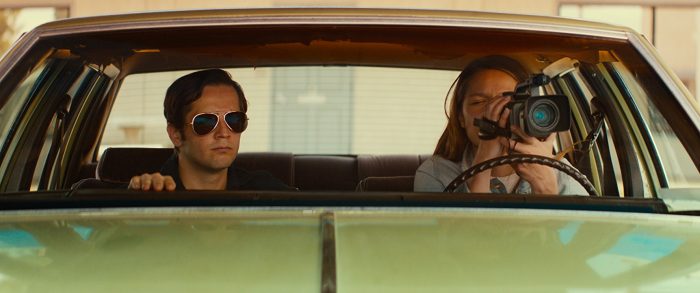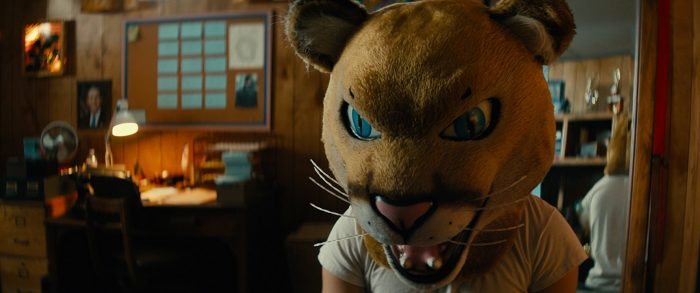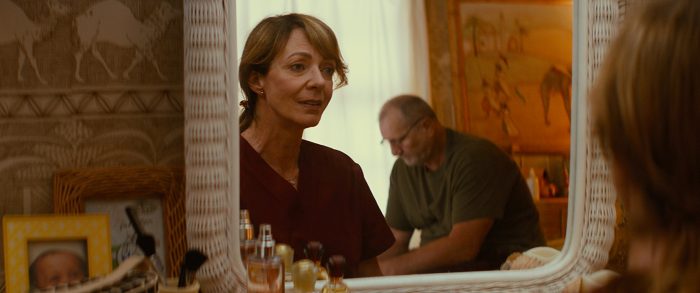Jennifer Morrison Steps Behind The Camera To Make Her Directorial Debut With Netflix's 'Sun Dogs' [Interview]
Jennifer Morrison has spent half of her life in front of the camera. She has spent half of her career on TV. But with her directorial debut Sun Dogs, Morrison is stepping out of both of her comfort zones.
Which is why it's amazing how easily she settles into her role behind the camera. Sun Dogs (streaming now on Netflix), a cheery and offbeat family drama that follows a naive do-gooder in post-9/11 America, is Morrison's first feature film, but the former House and Once Upon a Time star has already established a distinct visual identity. It's a whimsical, zippy aesthetic borrowed from directors like Hal Ashby and Wes Anderson — filmmakers that Morrison says are her biggest influences — which she first tested in her 2015 short film, Warning Labels.
I interviewed Morrison about her directorial debut, how she drew inspiration from Hal Ashby's classic comedy-drama Being There, and what it's like being part of a new wave of women poised to take over Hollywood at the height of the #MeToo movement.
 How did you get drawn to the story of Sun Dogs?
How did you get drawn to the story of Sun Dogs?
I was drawn to this script. I felt like they were such great characters and I loved the idea of everyone searching for their purpose in life and I loved the overriding message that sometimes the simplest things can make the biggest difference. It's not often you see a story told in a way where it has that message but you can go on such fun adventure. So I just felt like I related to all the characters and I loved that message and I could picture that spin-off in my mind, the way I could see it, so I decided to go for it.
You seem to have a strong stylistic eye that's consistent in your feature film and also the short film you've directed, Warning Labels — a sort of cheery, upbeat and sunny style. Was this a directorial choice that just had to do with the story of each of those films, or is this a style you'll want to maintain in the future?
I don't know for sure. It's definitely my taste I definitely grew up loving Hal Ashby films, I loved Being There and Harold and Maude, and then I loved Wes Anderson's Rushmore and The Graduate. You can sort of see the things that influenced me in the way I visually approached both of those projects. But I also do feel like the visual element to a film should also match the storytelling. There's definitely been projects that I've pitched on and I've considered than Sun Dogs that would be drastically different visually just because the story would require them to be drastically different visually. So I'm excited and open about the idea of branching out visually but my personality is still my personality, and my eye is still my eye. So my guess is there's always going to be a little bit of a throughline in terms of something feeling like a film that I made. But I hope to be malleable enough as a filmmaker to be able to adapt to different genres and different storytelling and make sure that the visuals reflect the storytelling properly.
Speaking of visuals reflecting the storytelling, this movie deals with some timely, uncomfortable issues like the profiling and racism against Muslim citizens or people of color. But the movie remains upbeat and focused on Ned's story. Was there ever an intention to probe into those issues more?
It's one of those things that's obviously very tricky and tonally I wanted to be very, very careful about how we approached all of it. Part of it being set in 2004, we were at a time in America where everybody was so afraid. We were only three years away from 9/11 having happened, and there were a lot of people coming from a perspective of fear but not necessarily realizing that they were hurting someone in their perspective. So I was trying to let the environment be true to that of the time and be as honest to what the characters would have done in that moment. And I wanted to make sure that they were held accountable for the mistakes that they made. So that was something that was very important to me in terms of the storytelling in how everything was pieced together.
Ned is a really interesting character in that regard. He buys into all these jingoistic ideas but because he's mentally disabled, you really sympathize with him. Was that in the script where he was this sort of naive character who you sympathize with but you want to hold him accountable?
The way I always thought — and Michael Angarano and I spoke about this quite a bit — what was interesting was this was is an opportunity, and this is going back to Being There a little bit: the whole film was built on this idea that this character is incredibly naïve, and the way the world sort of projects meaning onto the way that he interacts with the world. So there was a little bit of Being There inspiration in the sense that, because Ned was a little limited because of this accident that happened at birth he was so innocent that there was nothing malicious in his intent at any moment. An audience would think there's malicious intent, but he's really just trying to do his best. Absolutely what I was aiming for was to have the audience on his side and rooting for him to learn and grow from his mistakes.
Ned's mental illness is never really named except when Bob says he has half a brain in an angry outburst. Was there a reason for keeping it vague?
We were not making a movie that was about mental illness, we were not making a movie that was about how he fell or what the follow-up to that was. We were telling a story that happens to include someone who has an illness. It would have been a much longer movie to try to explain it all and get all the details. Really it was about a young man who happened to be in a situation where he could be as naïve as he is, because of the circumstances. If ultimately we got sidetracked trying to explain the medical side of it, then it becomes a completely different film, you completely lose the story that we're telling.
It's tricky and I was very aware tonally that this is a tricky line to walk. I went back over and over again to Being There because it was a film that was able to sustain that for two hours. You never find out what's wrong with Chauncey Gardner in that film, you never know what the case is. So in order to tell the story that we wanted to tell, which was the idea that people wanted to find purpose in life, and this was a very innocent perspective, we needed to address that there was something wrong, but we didn't want to make the central storytelling us trying to explain his childhood and what he went through and what that illness was when he was young. It was just: this is a man, and as a young man, he's dealing with the fact that this is who he truly is and he wants to find his purpose in life.
 Right, and that goes along with the visual tone that you had as well, which was less sort of sentimental and more upbeat.
Right, and that goes along with the visual tone that you had as well, which was less sort of sentimental and more upbeat.
Yeah, Ned's a very positive guy. To me, that's really inspiring. It's someone who really does see the best in life and he really does have the optimism of believing that he could make a difference. And I think that's a really powerful thing, and I wanted that to be reflected in the tone of the film.
So how would you characterize the film exactly? Is it a film about illness? Is it a film about people learning to communicate? But it's also sort of about 9/11 as well...
It's not actually about any of those things. Those things are all part of the reality of life. I'm trying to take all the textures of real life for these people and let that be the world that they're living in. It's the facts that this family happens to be living in, the way that any family is living in their own set of facts. It's set in a time where we were three years away from 9/11 and there was an atmosphere of fear in this country, and that was affecting people's decisions and oftentimes making them make bad decisions because they were afraid. All of this was the backdrop of this moment in time of Ned's life. So really I've always seen the story as a family drama that has some funny moments because sometimes real life is funny. It's not a comedy, it's not a thriller, you know, it's a family drama that has some funny moments the way any family in real life has funny moments. Ultimately it's people searching to find connections with each other and hoping that in those connections they can become better people.
You made a brief appearance in the film too. Was it difficult to act on camera and direct at the same time?
It is definitely weird. I have a lot of respect for people who manage pulling off being the lead in a film that they're also directing. I hope someday to pull that off. But I definitely enjoy while I'm in the zone of directing being able to see on the monitors and see everything, and being able to get in there and enjoy working with the actors and enjoy working with the crew. It definitely feels harder to have that same momentum creatively when you're stopping and having to play the part and step away and rewatch everything. It just adds an extra step to things. Like I said, I have a lot of respect for anyone who pulls it off effortlessly. But I definitely prefer one or the other, I would rather be just acting or just directing. But I have a feeling that will be in my future someday, but I don't know if it's in my near-future.
This is your directorial debut after years of acting on TV and in movies. Was there an inciting factor that made you want to jump behind the camera?
It just seemed to naturally evolve. I started directing theater pretty young — I directed theater in high school, college, and a couple small productions when I first moved to Los Angeles — and I really enjoyed that. And as I was working more and more on film and television and exposed to all these creative people who knew all the technical sides to things, I started picking people's brains and starting to try to learn about all of it. I really started to dive into the technical side of filmmaking just out of the curiousity of spending so many hours of the day around it and wondering if it was something I was able to do. I don't know, it was just one of those things that seemed to naturally work out.
I had been thinking about it, but hadn't really committed to directing something. I was helping a friend [Janelle Riley, who wrote the script for Morrison's short Warning Labels] turn a play into a screenplay. And a producer I was working on a film with came to me and said, "Oh I came across this script and it made me think of you. Would you ever be interested in directing?" And I said, "It's so interesting that you bring up that script, because I've actually been working with the writer to turn it into a screenplay," so I was kind of connected to it without him realizing. And he was like, "I don't know I just watch how you work on set, and how you think, and how your brain works, and I just feel like you're a director." And I said, "No I feel that way too, but I think I'd rather just start with a short film." So that's how the first short film was born, out of having those conversations where not only was I starting to think that way, but people around me were starting to think that way about me. So I thought, why not try this? And I really enjoyed it and felt really creatively lit up doing it. So I just wanted to try figuring out how to do more and more of it.
 We're in the midst of the Time's Up movement and more opportunities for women to get behind the camera than ever. Greta Gerwig received a Best Director nomination, Patty Jenkins and Ava DuVernay are doing well at the box office. And Sundance this year featured more female directors than years past. Do you think there is a new wave of female directors poised to take over Hollywood, and how do you feel being part of that wave?
We're in the midst of the Time's Up movement and more opportunities for women to get behind the camera than ever. Greta Gerwig received a Best Director nomination, Patty Jenkins and Ava DuVernay are doing well at the box office. And Sundance this year featured more female directors than years past. Do you think there is a new wave of female directors poised to take over Hollywood, and how do you feel being part of that wave?
I really hope so. I feel like it's really exciting being part of a time when there's attention being drawn to the discrepancy between how many women and men directors there are out there. That people are really making sure to be inclusive and open-minded, and realizing that there's a lot of women who have amazing stories to tell, just like there are a lot of men who have amazing stories to tell. It's exciting to be a part of a time where as I'm developing as a filmmaker, and I'm really passionate about the stories I want to tell, instead of being sidelined or having extra obstacles that I'm actually being lifted up and being supported. And my hope is that it's happening for a lot of women out there.
People like Greta and the work that she's done, and Ava like you mentioned — you look at the early pioneers like the Kathryn Bigelows of the world, the Catherine Hardwicks, they didn't necessarily have the same support system and they were still pushing through and finding a way. It's exciting because I feel like we're going to start to see really different films. We're going to start seeing films with different perspectives, and different voices, and different ideas. It was so fun to watch Lady Bird and feel like I was finally seeing a coming-of-age story about a girl, and I thought, Oh my god, I totally relate to this! Man, men get this all the time! But it's so rare that you get a coming-of-age story for a woman. I felt the same way watching Wonder Woman, I felt really emotional because it never occurred to me as a little girl that I never had a female superhero to look up to. I thought, oh man I can't imagine if I were 10 years old and having a role model as this. It's so important to have a balance of both, and it's exciting to see that the whole industry seems to be opening their eyes to that and really embracing that idea of finding that balance.
Now that OUAT is ending and Sun Dogs is coming out, what are your next plans?
I just want to tell great stories. I'm actively looking for different projects now, I'm writing a project that I'm not sure if it will be the very next thing I'll direct, but it's a female-driven project for sure. And I'm kind of in the mix with a couple of really big films that I would love to be a part of, and I do believe in the storytelling. So there's a lot of things that are in the works. I'm not sure exactly what the very next thing as a director is going to be, but I just want to tell great stories and put great characters on screen. And I feel really lucky that I'm pursuing this in a moment when there really is support for female filmmakers.
So do you want to stay with feature filmmaking or do you want to try your hand at television as well since you've been in TV for so long?
Yeah, I think there's so much great television out there now, and there's a lot of things I would love to be a part of. I think it's a tricky world to break into — every show has their favorite directors, networks have their go-to directors. So it's a tricky business, but there are definitely shows out there that my style would really fit well with. My hope is that as my team and I continue pursuing things, that I'll be able to have a nice balance of directing features but also directing episodes of things for shows that I really like.
